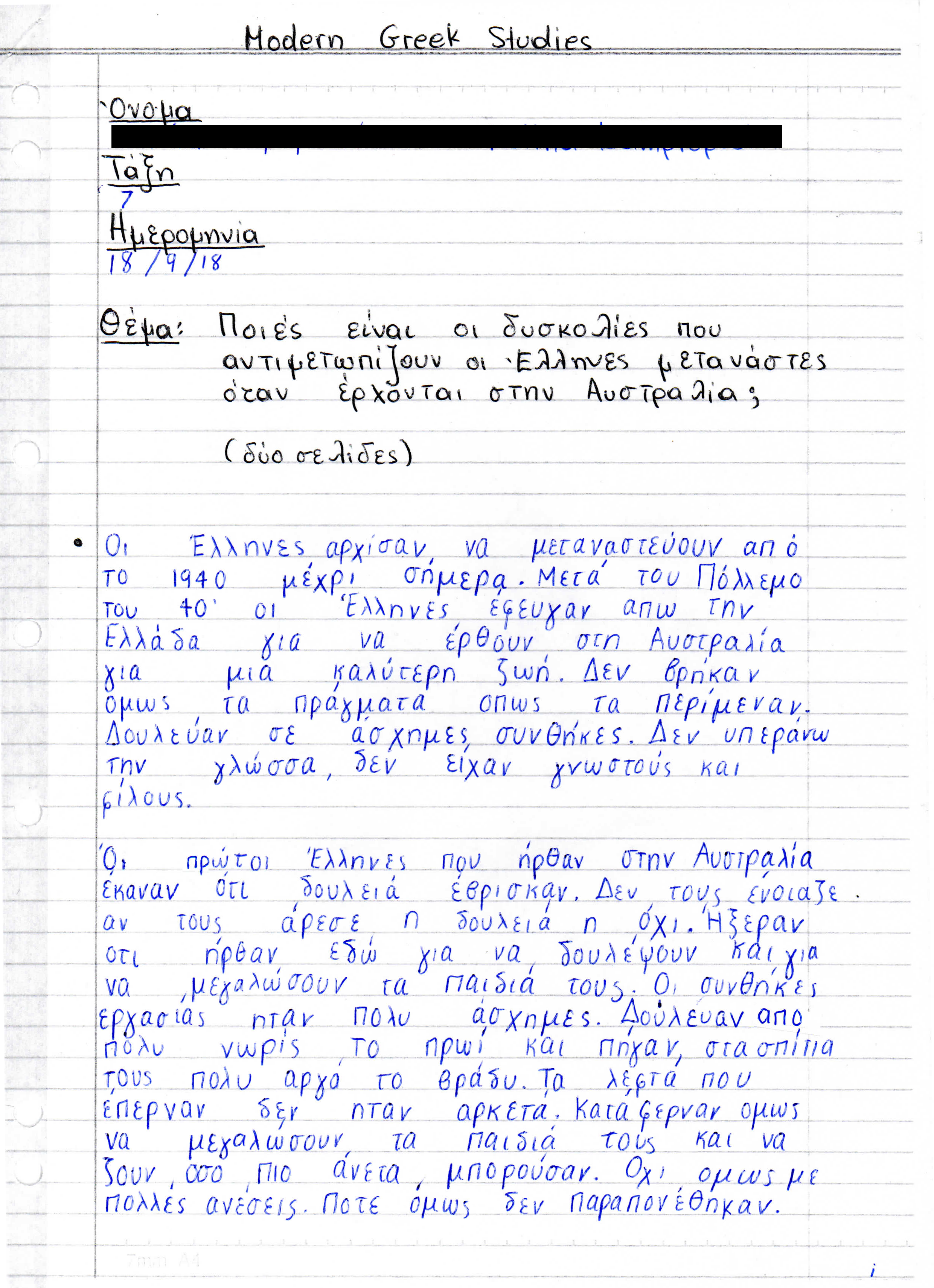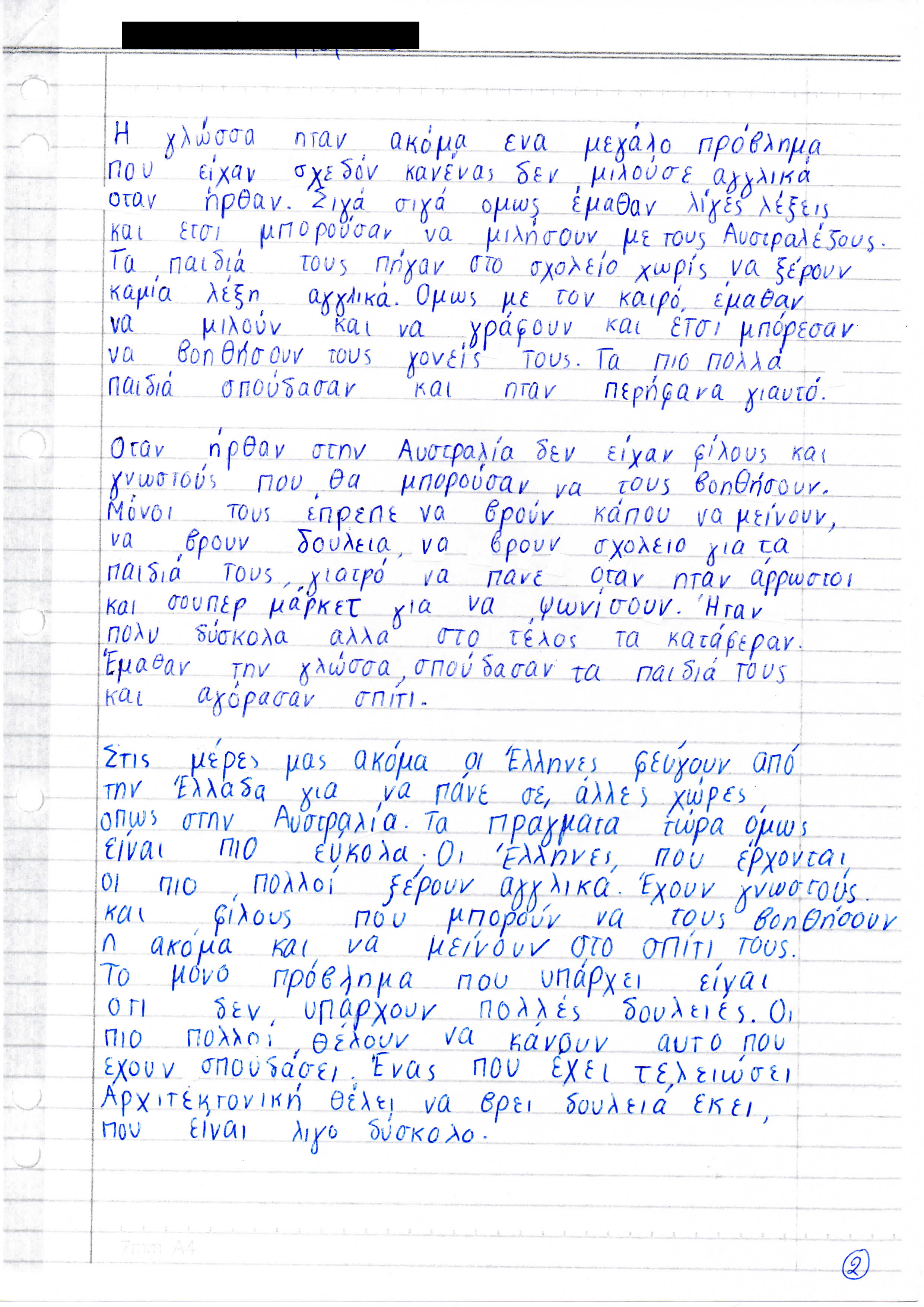- Home
- Resources
- Work samples
- Samples
- Greek migrants - AT
Languages: Modern Greek
Years 9 and 10 (Year 7 entry)
Satisfactory
Greek migrants
Summary of task
Students studied the patterns of Greek migration from antiquity to modern times. They compared and contrasted the reasons (overpopulation, trade, war, economic conditions). They concluded the unit with the study of Greek migration to Australia.
In this task students wrote a short answer essay on Greek-Australian relations and challenges of migration, using notes they had made over the course of the unit. They completed the task under timed conditions in class.
Achievement standard
By the end of Year 10, students initiate and sustain interactions with peers by sharing opinions and experiences and comparing aspects of teenage life (for example, Πού θα πας διακοπές; Θέλω ναγίνω πιλότος γιατί ...). They interact with others to make decisions and plan events. They ask and respond to questions, clarify understanding and express agreement or disagreement in structured discussions and tasks, and spoken and written transactions (for example, Πάμε στο σινεμά αύριο; Συμφωνείς; Θέλω/Δε θέλω). When interacting, they use appropriate pronunciation, rhythm and stress (for example, σ’ αυτόν, κοντά στην πόλη, Πάω στο ταχυδρομείο, Πάμε στη λαϊκή αύριο;). Students locate and analyse information and perspectives from a range of texts and communicate information and ideas using different modes of presentation selected to suit audience and purpose (for example, Μου αρέσει αυτό το έργο γιατί ..., είναι ωραίο, πιστεύω, νομίζω, διαφωνώ). They share their responses to imaginative texts by expressing personal preferences, feelings and opinions about themes, mood and language choices (for example, Η μόδα είναι μονότονη,Αγόρασα καινούριο κινητό). They use different techniques to produce imaginative texts for different audiences. They use a range of grammatical structures and elements to describe, situate and link people, objects and events, and apply their knowledge of vocabulary and grammatical structures such as Είναι καλό, πολύ καλό, πάρα πολύ καλό, to extend meaning. They translate, interpret and create texts in Greek and English for the wider community (for example, Απαγορεύεται, Περαστικά). When interacting, students share responsibility for making meaning. They give examples on how their identity influences their intercultural exchanges.
Students identify and reproduce regularities and irregularities of sound–letter relationships and combinations such as, αυ, ευ, ββ, λλ, ρρ, ττ, ιου, ιο/ιό (for example, τετράδιο-χωριό), ειο/ειου, αϊ, άι, -ασμα, (for example, διάβασμα). They analyse a range of text types in various modes to explain the relationship between context, purpose and audience and to identify structural, linguistic and culturally specific features. They compare Greek language and culture in various linguistic and cultural settings in Australia and overseas, and give reasons for variations that exist. They identify ways that Greek language has changed over time and propose reasons why it continues to change. They explain how cultural assumptions, attitudes and beliefs can affect interactions and appreciate the importance of mutual understanding to effective communication.
Annotations overview
Structures essay with paragraphs and chronological sequences (adverbs) and punctuation.
 1
Annotation 1
1
Annotation 1
Introduces context and theme of text 2 Annotation 2
Commences essay using historical information 3 Annotation 3
Uses time clause to indicate the beginning of an event 4 Annotation 4
Uses comparative adjective 5 Annotation 5
Compares expectations of migration to reality of new situation 6 Annotation 6
Uses past tense to link and situate people and events 7 Annotation 7
Uses conjunction to emphasise and reaffirm previous points 8 Annotation 8
Uses adverbial phrases to sequence events 9 Annotation 9
Uses irregular letter combination
-
Annotations
-
1
Annotation 1
Introduces context and theme of text -
2
Annotation 2
Commences essay using historical information -
3
Annotation 3
Uses time clause to indicate the beginning of an event -
4
Annotation 4
Uses comparative adjective -
5
Annotation 5
Compares expectations of migration to reality of new situation -
6
Annotation 6
Uses past tense to link and situate people and events -
7
Annotation 7
Uses conjunction to emphasise and reaffirm previous points -
8
Annotation 8
Uses adverbial phrases to sequence events -
9
Annotation 9
Uses irregular letter combination
 1
Annotation 1
1
Annotation 1
Uses adverb to show continuity of an event 2 Annotation 2
Uses a range of techniques to show time sequence 3 Annotation 3
Understands language nuances 4 Annotation 4
Uses preposition with verb form 5 Annotation 5
Recognises importance of language and effective communication 6 Annotation 6
Expresses opinion about difficulties and ability to overcome them 7 Annotation 7
Uses language features and grammatical techniques to connect past with present 8 Annotation 8
Expresses opinion by comparing past and present 9 Annotation 9
Demonstrates understanding of passive voice 10 Annotation 10
Changes tense to indicate current events 11 Annotation 11
Concludes essay by raising current issues
-
Annotations
-
1
Annotation 1
Uses adverb to show continuity of an event -
2
Annotation 2
Uses a range of techniques to show time sequence -
3
Annotation 3
Understands language nuances -
4
Annotation 4
Uses preposition with verb form -
5
Annotation 5
Recognises importance of language and effective communication -
6
Annotation 6
Expresses opinion about difficulties and ability to overcome them -
7
Annotation 7
Uses language features and grammatical techniques to connect past with present -
8
Annotation 8
Expresses opinion by comparing past and present -
9
Annotation 9
Demonstrates understanding of passive voice -
10
Annotation 10
Changes tense to indicate current events -
11
Annotation 11
Concludes essay by raising current issues